Can mouth ulcers be prevented?
Ans: While there is no surefire way to prevent mouth ulcers, there are steps you can take to reduce your risk of developing them. This includes maintaining good oral hygiene, avoiding trigger foods, managing stress, and ensuring you are getting adequate nutrition.
If you’ve ever had a mouth ulcer, you know how painful and uncomfortable they can be. Mouth ulcers are small, shallow sores that can develop on the inside of your mouth or on your gums. While they usually go away on their own within a week or two, there are some natural remedies you can try to help speed up the healing process and relieve the pain. In this article, we’ll discuss some of the best ways to cure ulcer in mouth naturally, so you can get back to feeling like yourself again.
Understanding Mouth Ulcers
Before we dive into natural remedies for mouth ulcers, it is essential to understand what mouth ulcers are, their causes, and symptoms.
What Are Mouth Ulcers?
Mouth ulcers are small, shallow sores that develop in the mouth, usually on the inside of the lips, cheeks, or gums. They can also occur on the tongue, the roof of the mouth, and the back of the throat. Mouth ulcers are not contagious, but they can be very painful and make it difficult to eat, drink, or talk. They usually heal on their own within a week or two, but in some cases, they can be a sign of a more serious underlying condition.
Common Causes of Mouth Ulcers
The exact cause of mouth ulcers is not always clear, but there are several potential factors that may contribute to their development. (1, 2 & 3)
- Injury to the mouth, such as biting the inside of the cheek or lip, or brushing the teeth too vigorously,
- Stress or anxiety,
- Hormonal changes, such as those that occur during menstruation,
- Food allergies or sensitivities,
- Nutritional deficiencies, such as a lack of vitamin B12, iron, or folic acid,
- Certain medications, such as nonsteroidal anti-inflammatory drugs (NSAIDs) or beta-blockers,
- Medical conditions, such as celiac disease, inflammatory bowel disease, or a weakened immune system.
Symptoms for Mouth Ulcer
Mouth ulcers can cause a range of symptoms, including: (2 & 3)
- Pain or discomfort in the affected area,
- Redness or inflammation,
- Swelling,
- White or yellowish coating on the sore,
- Difficulty eating, drinking, or speaking,
- Fever in severe cases.
How to Cure Ulcer in Mouth: 10 Natural Way to Cure Mouth Ulcers Fast
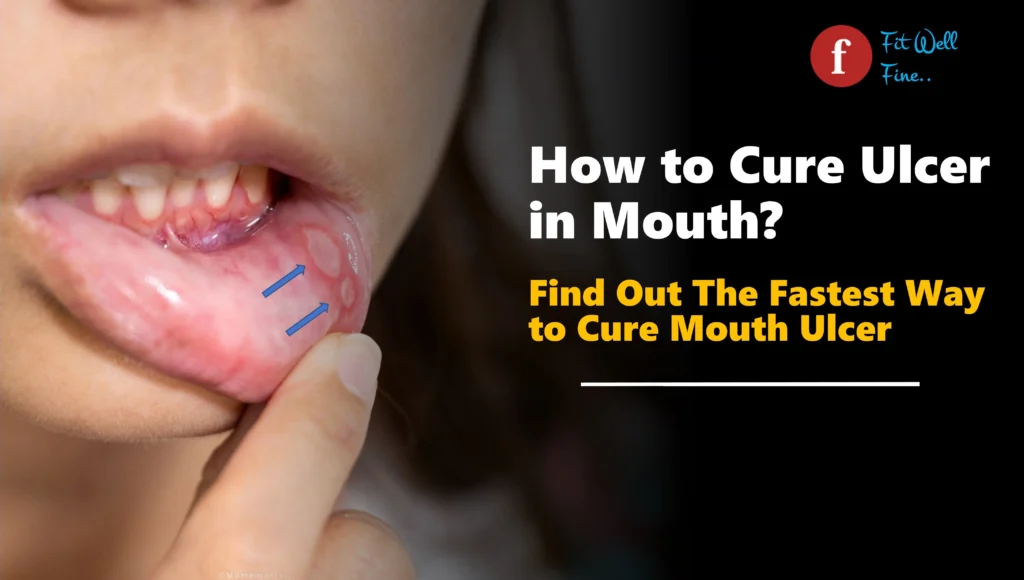
Research has shown that certain home remedies can be effective for managing the symptoms of mouth ulcers and promoting fast healing. Here are some evidence-based natural home remedies for mouth ulcers.
Honey
Honey is a great natural remedy for mouth ulcers, which has been used for centuries to treat a variety of illnesses. It’s full of antioxidants and antibacterial properties that can help support the healing process from mouth ulcer pain.
According to a 2014 studyTrusted Source, honey is effective in reducing canker sore pain, size, and redness. It also may help prevent secondary infection. (5)
How to use-
To use honey for the treatment of mouth ulcers, apply a small amount of honey directly to the ulcer using a clean cotton swab or your finger.
Allow the honey to sit on the ulcer for a few minutes before rinsing your mouth with warm water. Repeat this process two to three times a day until the ulcer has healed.
Side effects
It is important to note that honey should not be given to infants under the age of one year, as it may contain botulism spores that can cause serious illness in young children.
Additionally, people with allergies to bee products should avoid using honey as a remedy for mouth ulcers.
Salt Water Rinse

One of the most common and simplest preventive measures for treating mouth ulcers is to rinse your mouth with warm water mixed with salt.
Research has shown that salt water rinses can be an effective home remedy for managing the symptoms of mouth ulcers and promoting healing. (4)
How to use-
To prepare the solution, mix one teaspoon of non-iodized salt into a cup of warm water. Swish it around your mouth for 30 seconds and then spit it out immediately. Repeat this process 2-3 times a day until the ulcer heals completely.
It is important to note that while a saltwater rinse can provide temporary relief from pain, it is not a cure for mouth ulcers. If you experience persistent or severe mouth ulcers, it is important to seek medical advice from a healthcare professional.
Baking Soda
Baking soda contains antiseptic and anti-inflammatory properties that can help to reduce painful mouth ulcers. It also has the ability to balance the acidity of your saliva, which helps to neutralize the area where you have a mouth ulcer. (6)
How to use-
To use baking soda for the treatment of mouth ulcers, mix one teaspoon of baking soda with water to form a paste. Apply the paste directly to the ulcer using a clean cotton swab or your finger.
Allow the paste to sit on the ulcer for 5 minutes before rinsing your mouth with warm water. Repeat this process two to three times a day until the ulcer has healed.
Side effects
It is important to note that baking soda should be used in moderation and not swallowed. Overuse of baking soda can lead to oral irritation and damage to tooth enamel.
Aloe Vera Gel
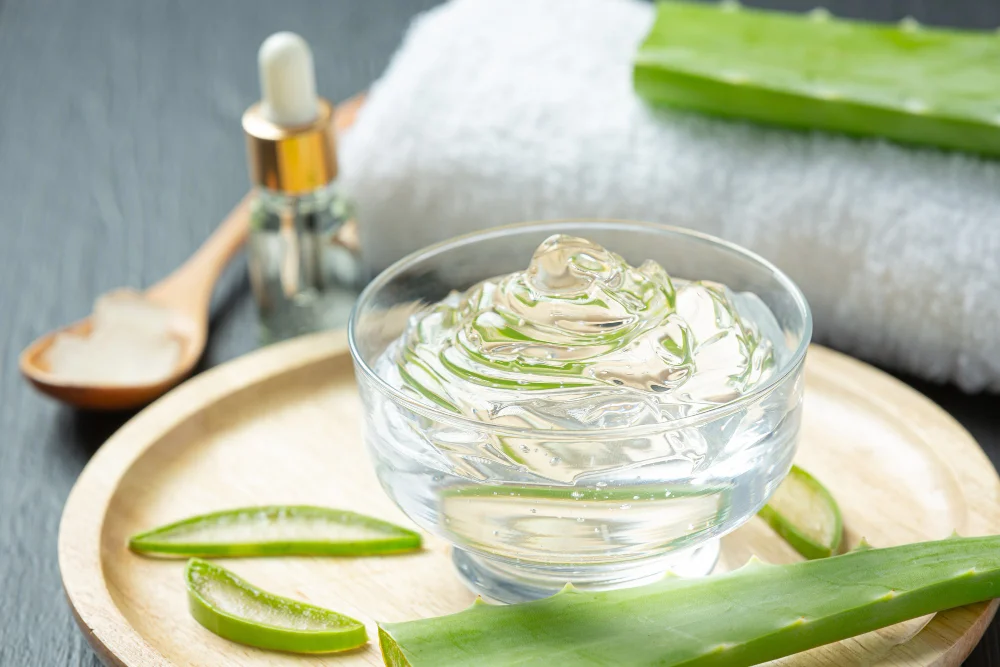
Aloe Vera is a well-known natural remedy when it comes to treating several skin conditions, including mouth ulcers. It not only helps in accelerating the healing process of the sores but also soothes pains and itching caused by them. (7)
How to use-
To use Aloe Vera Gel as a treatment for mouth ulcers, simply apply some gel directly to the affected area and allow it to stay for about 5 minutes before rinsing your mouth with cool water. Repeat this procedure 2-3 times daily for best results.
Side effects
It is important to note that aloe vera gel should be used in moderation and not swallowed. Overuse of aloe vera gel can cause gastrointestinal distress.
Additionally, some people may be allergic to aloe vera, so it is important to perform a patch test before using it on mouth ulcers.
Tea tree oil
Tea tree oil is a natural essential oil that has been used for its antiseptic and anti-inflammatory properties. It is believed that tea tree oil can help to alleviate pain and promote healing in mouth ulcers. (8)
How to use-
To use tea tree oil for the treatment of mouth ulcers, dilute a few drops of tea tree oil in a carrier oil, such as coconut oil or olive oil. Apply the diluted solution directly to the ulcer using a clean cotton swab or your finger.
Now, allow the solution to sit on the ulcer for a few minutes before rinsing your mouth with warm water. Repeat this process two to three times a day until the ulcer has healed.
Side effects
Tea tree oil may cause skin irritation in some people, so it is important to perform a patch test before using it on mouth ulcers. If you experience persistent or severe mouth ulcers, it is important to seek medical advice from a healthcare professional.
Coconut Oil
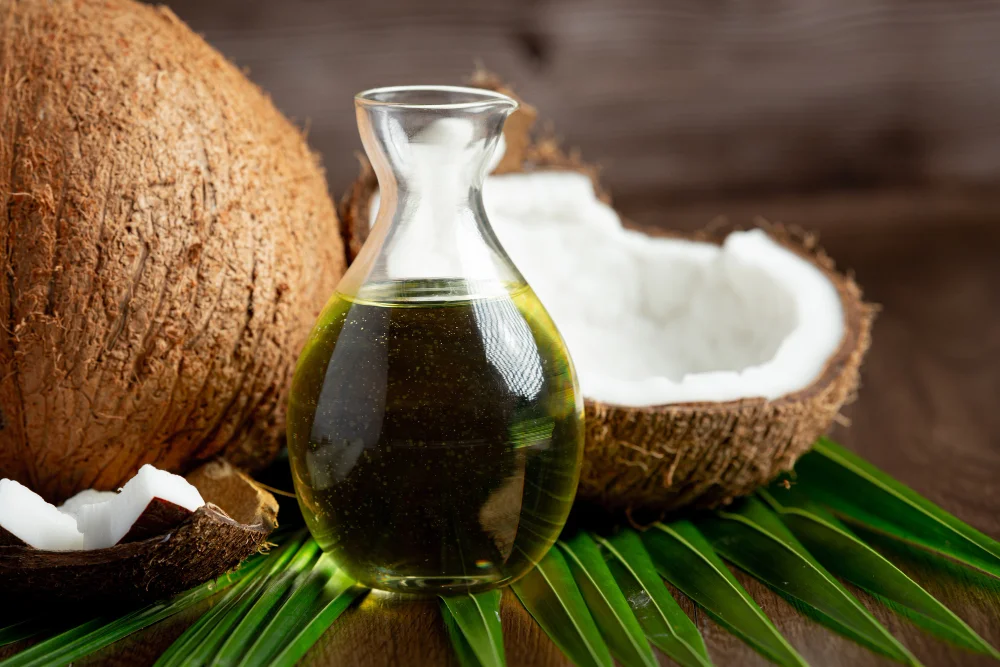
Coconut oil is a natural remedy that can help in reducing inflammation, speeding up the healing process of mouth ulcer and relieving pain. Rich in lauric acid, it also has antiviral, antifungal, and antibacterial properties that fight infection-causing bacteria. (9)
How to use-
To use coconut oil for the treatment of mouth ulcers, apply a small amount of the oil directly to the ulcer using a clean cotton swab or your finger.
Allow the oil to sit on the ulcer for a few minutes before rinsing your mouth with warm water. Repeat this process two to three times a day until the ulcer has healed.
Coconut oil can also be used as a mouthwash by swishing a tablespoon of the oil in your mouth for 10 minutes before spitting it out. This process, known as oil pulling, is believed to have additional benefits for oral health.
Side effects
It is important to note that while coconut oil is generally safe for use, it may cause allergic reactions in some people.
Alum powder
Alum powder, also known as potassium aluminum sulfate, is a crystalline powder that has been traditionally used as a home remedy for treating mouth ulcers.
It is believed to have astringent and antiseptic properties that can help reduce inflammation and promote healing of the ulcerated tissue. However, there is limited scientific evidence to support its effectiveness for treating mouth ulcers. (10)
How to use-
To use alum powder for mouth ulcers, a small amount of the powder can be mixed with water to create a paste.
The paste can then be applied directly to the affected area with a cotton swab. It is important to avoid swallowing the paste as it can be toxic if ingested.
The paste can be left on for a few minutes before being rinsed off with water. This process can be repeated up to three times a day.
Side effects
It is not recommended for individuals with kidney problems, as the aluminum in the powder can accumulate in the body and worsen kidney function.
Apple cider vinegar
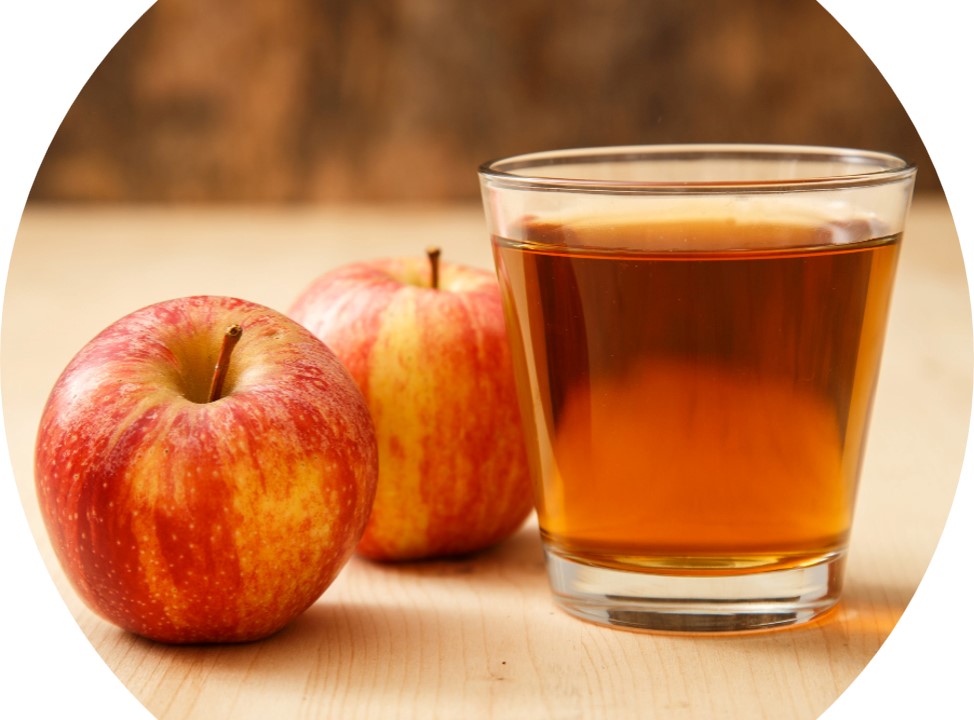
Apple cider vinegar is a type of vinegar made from fermented apple cider that has been used as a home remedy for various health conditions, including mouth ulcers.
It is believed to have antimicrobial properties that can help reduce inflammation and promote healing of the ulcerated tissue (11). However, there is limited scientific evidence to support its effectiveness for treating mouth ulcers.
How to use-
To use apple cider vinegar for mouth ulcers, a small amount of the vinegar can be diluted with water and used as a mouthwash.
The mouthwash can be swished around the mouth for about 30 seconds before being spit out. This process can be repeated up to three times a day.
Side effects
Undiluted apple cider vinegar can be highly acidic and may cause irritation or damage to the teeth and oral tissues. It is recommended to always dilute the vinegar before using it as a mouthwash.
Mulethi
Mulethi, also known as licorice root, is a commonly used herb in Ayurvedic and traditional Chinese medicine. It is known for its anti-inflammatory, antibacterial, and soothing properties, which make it useful in treating various health conditions, including mouth ulcers.
The research suggests that mulethi may have potential benefits for treating and preventing mouth ulcers. However, more studies are needed to fully understand its effectiveness and safety. (12)
How to use-
Mulethi can be used in different forms, including as a powder, extract, or infusion. When used for mouth ulcers, it is usually prepared as a mouth rinse or gargle.
To prepare the mouth rinse, a small amount of mulethi powder can be mixed with water to form a paste, which can then be diluted with more water to create a rinse. The rinse can be used several times a day to help reduce pain and inflammation associated with mouth ulcers.
Mulethi can also be chewed directly to help soothe the ulcers and promote healing.
Side effects
Excessive consumption of mulethi may have adverse effects on health, especially for people with high blood pressure, so it is recommended to use it in moderation.
Basil
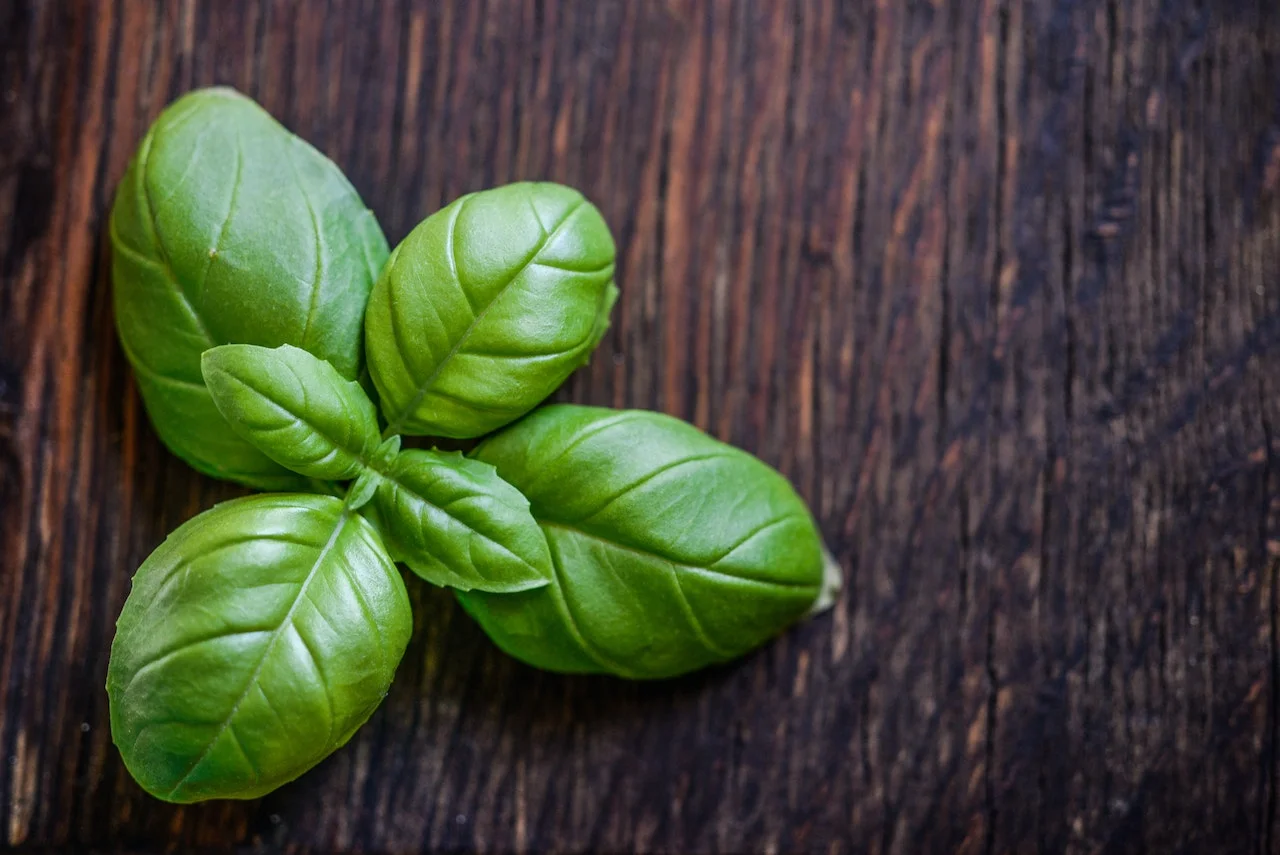
Basil, also known as tulsi, is a popular herb in traditional medicine and is widely used for its medicinal properties. One of its many benefits is its potential to help alleviate the pain and discomfort associated with mouth ulcers.
Research has shown that basil contains compounds such as eugenol, rosmarinic acid, and ursolic acid, which may help to reduce inflammation and fight off infection in the mouth.(13)
Additionally, basil is believed to have pain-relieving properties that can help to alleviate the discomfort associated with mouth ulcers.
To use basil for mouth ulcers, there are a few different methods that can be effective:
- Chew on fresh basil leaves: Simply chew on a few fresh basil leaves several times a day, making sure to hold the leaves against the ulcer for a few minutes before swallowing. This can help to reduce inflammation and promote healing.
- Make a basil tea: Boil a handful of fresh basil leaves in a cup of water for 5-10 minutes. Allow the tea to cool, then swish it around in your mouth for a few minutes before swallowing. This can help to reduce inflammation and promote healing.
-
Use basil oil: Mix a few drops of basil oil with a carrier oil such as coconut oil or olive oil. Apply the mixture directly to the ulcer using a cotton swab. This can help to alleviate pain and promote healing.
Learn more- 10 Natural Ways to Get Rid of Red Eyes Without Eye Drops
Prevention Tips and Lifestyle Changes for Mouth Ulcers
Along with home remedies, certain lifestyle changes can help reduce the risk of developing mouth ulcers or speed up the healing process. Some of the lifestyle changes that may help cure mouth ulcers include: (19 & 20)
Good oral hygiene
Maintaining good oral hygiene can help prevent infections and reduce the risk of developing mouth ulcers. This includes brushing teeth twice a day, using fluoride toothpaste, and flossing regularly.
Avoiding trigger foods
Certain foods and beverages such as spicy or acidic foods, hot drinks, and alcohol can irritate the mouth and trigger the formation of mouth ulcers.
Avoiding these trigger foods can help prevent the development of new ulcers and reduce pain associated with existing ulcers.
Stress reduction
Stress can weaken the immune system and increase the risk of developing mouth ulcers. Practicing stress-reducing techniques such as meditation, deep breathing exercises, and yoga can help reduce stress levels and prevent the formation of ulcers.
Adequate rest
Getting enough rest and sleep is essential for maintaining a healthy immune system and promoting healing of the ulcerated tissue.
Avoiding trauma to the mouth
Trauma to the mouth such as accidental biting or injury during dental procedures can lead to the formation of mouth ulcers. Taking care to avoid trauma to the mouth can help prevent the development of new ulcers.
Medical Treatments for Mouth Ulcers

There are various medical treatments available for mouth ulcers, depending on the underlying cause and severity of the condition. Some of the commonly used medical treatments for mouth ulcers include:
Topical medications
Topical medications such as corticosteroids, anesthetics, and antimicrobials can help reduce inflammation, pain, and infection associated with mouth ulcers.
These medications are available in the form of gels, creams, and mouthwashes, and can be applied directly to the affected area. (14)
Systemic medications
In some cases, systemic medications such as corticosteroids, immunosuppressants, and antibiotics may be prescribed to treat mouth ulcers. (15)
These medications are taken orally or through injections and are used to treat underlying conditions such as autoimmune disorders, viral infections, and bacterial infections.
Oral rinses
Oral rinses containing antimicrobial agents, such as chlorhexidine and hydrogen peroxide, can help reduce the risk of infection and promote healing of the ulcerated tissue. (16)
Nutritional supplements
Nutritional supplements such as vitamin B12, folic acid, and iron may be prescribed to individuals with recurrent or persistent mouth ulcers, as these conditions can be associated with nutritional deficiencies. (17)
Laser therapy
Laser therapy is a relatively new treatment option for mouth ulcers that involves using low-level lasers to reduce inflammation and promote healing of the ulcerated tissue. (18)
This treatment is still being studied, and its effectiveness for treating mouth ulcers is not yet well established.
When to Seek Medical Advice
Most cases of mouth ulcers can be treated at home and will heal on their own within a few days to a couple of weeks. However, there are some instances where it is important to seek medical advice:
Large or persistent ulcers
If an ulcer is larger than 1 cm in diameter or has not healed after 3 weeks, it is important to seek medical advice. This may indicate a more serious underlying condition.
Severe pain
If the pain from a mouth ulcer is severe or interferes with eating or drinking, medical attention may be necessary.
High fever
If a mouth ulcer is accompanied by a high fever, it may be a sign of a bacterial infection that requires medical treatment.
Difficulty speaking or swallowing
If a mouth ulcer makes it difficult to speak or swallow, it may require medical attention to prevent further complications.
Recurring ulcers
If a person experiences frequent or recurring mouth ulcers, they may be a symptom of an underlying health condition such as anemia, celiac disease, or a weakened immune system.
Read more- How to Stop Cough at Night: 12 Best Home Remedies
Read more- Quick and Easy Ways to Eliminate Bitter Taste in Your Mouth
Conclusion
In conclusion, mouth ulcers can be a painful and uncomfortable condition, but there are several natural remedies and treatment options available that can help to alleviate pain and promote faster healing.
If you are struggling with mouth ulcers, try some of the natural remedies mentioned above or speak with your doctor about other treatment options that may be available to you.
With the right care and attention, you can get relief from the discomfort of mouth ulcers and promote faster healing of the affected area.
FAQs
How long does it take for a mouth ulcer to heal?
Ans: Mouth ulcers are a common condition that can be painful and inconvenient, but they typically heal on their own within a week or two.
The healing process of a mouth ulcer can be aided by certain home remedies, such as rinsing with salt water or using a topical medication. However, in some cases, mouth ulcers may take longer to heal or may require medical intervention.
What to eat for mouth ulcers
Ans: When you have mouth ulcers, eating can be a painful experience. Certain foods can make the pain worse, while others may help to soothe the ulcer and promote healing.
Soft, non-spicy foods like mashed potatoes, cooked vegetables, and soft fruits like bananas or applesauce are recommended. Cold foods such as ice cream, smoothies, and cold yogurt can help to numb the area around the ulcer and reduce pain.
Do home remedies for mouth ulcer work?
Ans: Home remedies can be effective for managing the symptoms of mouth ulcers and promoting healing. One commonly used home remedy is rinsing the mouth with salt water, which can help to reduce inflammation and promote healing.
A mixture of baking soda and water may also be used as a mouthwash to help neutralize acidity in the mouth and promote healing.
How mouth ulcers form?
Ans: It is important to note that individuals do not intentionally form mouth ulcers. Mouth ulcers, also known as aphthous ulcers, can form spontaneously due to a variety of reasons.
The exact cause of mouth ulcers is not fully understood, but they are thought to be related to a combination of factors. Injuries to the mouth, such as biting the inside of the cheek or lip, can lead to the formation of ulcers.
Additionally, certain medications can cause oral ulcers as a side effect. Nutritional deficiencies, particularly of vitamin B12, iron, and folic acid, may also contribute to the development of mouth ulcers.
Can mouth ulcers be prevented?
Ans: While there is no surefire way to prevent mouth ulcers, there are steps you can take to reduce your risk of developing them. This includes maintaining good oral hygiene, avoiding trigger foods, managing stress, and ensuring you are getting adequate nutrition.

